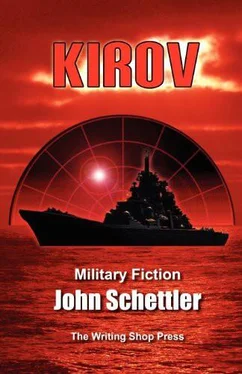John Schettler - Kirov
Здесь есть возможность читать онлайн «John Schettler - Kirov» весь текст электронной книги совершенно бесплатно (целиком полную версию без сокращений). В некоторых случаях можно слушать аудио, скачать через торрент в формате fb2 и присутствует краткое содержание. Жанр: Фантастика и фэнтези, Альтернативная история, на английском языке. Описание произведения, (предисловие) а так же отзывы посетителей доступны на портале библиотеки ЛибКат.
- Название:Kirov
- Автор:
- Жанр:
- Год:неизвестен
- ISBN:нет данных
- Рейтинг книги:5 / 5. Голосов: 1
-
Избранное:Добавить в избранное
- Отзывы:
-
Ваша оценка:
- 100
- 1
- 2
- 3
- 4
- 5
Kirov: краткое содержание, описание и аннотация
Предлагаем к чтению аннотацию, описание, краткое содержание или предисловие (зависит от того, что написал сам автор книги «Kirov»). Если вы не нашли необходимую информацию о книге — напишите в комментариях, мы постараемся отыскать её.
Kirov — читать онлайн бесплатно полную книгу (весь текст) целиком
Ниже представлен текст книги, разбитый по страницам. Система сохранения места последней прочитанной страницы, позволяет с удобством читать онлайн бесплатно книгу «Kirov», без необходимости каждый раз заново искать на чём Вы остановились. Поставьте закладку, и сможете в любой момент перейти на страницу, на которой закончили чтение.
Интервал:
Закладка:
“Come to condition one readiness on the number three forward missile array and activate targeting radars for that system.” He was ordering his CIC Chief to activate his P-900 cruise missiles, an array of ten subsonic sea-skimmers on the forward most section of the ship, very near the bow. In effect, he would be calling the enemies bluff, challenging their silence with a sharp push on the shoulder, letting them know he was fully prepared to take further action if they did not comply. Yet something within him whispered extreme caution. The situation was still a muddle of unanswered questions. Samsonov, like a note played on a well tuned keyboard, was quick to respond, activating his targeting radars and engaging the surface contact with an active signal.
“Mr. Nikolin,” said the Admiral. “Please repeat your hail.”
The tension was palpable on the bridge of Kirov when Rodenko reported a new and worrisome development. “Con, radar contact, airborne at 37 kilometers, south by southwest, and bearing on our position. Multiple contacts now! I read five…now six contacts, all airborne.”
“They are launching!” said Karpov. “I warned as much, Admiral. This is a NATO carrier task force after all. Recommend we come to full battle readiness. Prepare to oppose incoming air attack.” He turned to Fedorov, eying him darkly. “There’s your carrier air operations,” he said. “They were lying in wait. Playing possum!” Karpov was, of course, going to see the goblins he had conjured up in his own mind. From his point of view, the enemy was doing exactly what he would have done. They were simply springing a well laid trap, nothing more, nothing less.
Samsonov looked over his shoulder and Admiral Volsky noted how his hand was poised over the alert readiness alarm. The ship was already at action stations, but full alert would send the crew scrambling to a heightened level of preparedness.
“Speed?” The Admiral wanted to know what he was dealing with. Was this a missile barrage or a flight of strike aircraft as Karpov warned?
“Very slow, sir.” Rodenko watched his readings closely for a moment, realizing the gravity of the situation. If these were missiles the ship had but minutes, even seconds to respond. He wanted to make certain he was interpreting all the data accurately, and he hoped his systems were fully recovered from the anomaly they had experienced. His system showed no identifiable missile types inbound. Was it correct? All this passed in the barest moment within his mind, then he gave his best judgment.
“One contact inbound on our position…five contacts appear to be orbiting the surface group. These are aircraft, sir. Not missiles. I repeat. This is not a missile barrage.”
“How long before the inbound contact reaches us?” The game of cat and mouse between Russian and NATO forces had been ongoing for decades now. Both sides had been conducting active maneuvers in Norwegian Sea in recent years, each closely monitoring the activities of the other, and this could be nothing more than another overly curious NATO surface action group sent here to nose about his business, or perhaps, as Orlov suggested, they were merely investigating the anomaly Kirov herself had encountered.
“Inbound contact speed… 180 KPH, approximate,” said Rodenko. “Perhaps a Harrier jump jet, sir, or possibly a helicopter. It's certainly not an F-35 at that speed.” He was referring to the F-35 Lightning II, a stealthy, supersonic joint strike fighter rumored to be slated for deployment on the newest British carrier, Queen Elizabeth. “Inbound contact will be over us in 10 minutes, sir.”
“What about our KA-40?”
“It is already inbound as well, 10 kilometers out now. Probably already visible on the horizon.”
“Mister Nikolin,” said the Admiral. “Instruct the KA-40 to move due west away from our position. Designate this incoming plane as Red Wolf Three. They are to lock their air defense missile systems onto this contact, and hold fire pending further notification. Repeat, weapons tight.” The Admiral turned to Samsonov next. “Mister Samsonov activate primary air defense systems array and lock radar on contact. Weapons tight. The SA-N-92 system, if you please.” He was activating his medium range “Gauntlet” air defense missiles.
“Weapons tight, Admiral?” There was a derisive tone to Karpov's voice. “You're going to let them overfly us?” An over-flight would be standard operating procedure for any NATO task force. The plane would sweep gracefully by, the pilot thumbing his nose at the Russians as he passed. Sometimes they would launch emergency flares as mock weapons to rub in the fact that they could just as easily have launched live munitions. It had happened a thousand times before, largely without incident, but the circumstances here were quite different and the Admiral knew it. The fact that both Orel and Slava were still missing weighed heavily in the equation.
Karpov's wide eyed look of astonishment communicated his feelings on the matter transparently. Volsky knew that if the Captain had his way, this plane would be destroyed in a heartbeat. But he also knew that if he were to destroy the target, the enemy task force may be compelled to reply in kind, and he would soon find himself engaging ten to twelve NATO ships. If Karpov was correct, and this was a deception, then those ships were not old British carriers and cruisers, either. They would be lethal, modern ships like his own.
At that moment Nikolin noticed something on his radio band monitor and listened briefly. He had hold of the signal from London they had been waiting for, the BBC News broadcast at the top of the hour, regular as rain in these cold Arctic waters. Yet what he heard made no sense.
“BBC news broadcast, sir, but it's very odd.”
The Admiral was eager for any more information he could get. “Let me hear it,” he said.
“Admiral,” Karpov protested. “We have no more than seven or eight minutes now!”
Volsky raised his hand, quieting the man as he listened. The signal seemed faint and weak, and it was like nothing he had heard in recent years.
“…Vice Admiral Somerville successfully reinforced the embattled Island of Malta, when a powerful force steamed from Gibraltar to deliver much-needed supplies. President Roosevelt announced this week that all Japanese assets in the United States would be frozen, and he has suspended formal relations with Japan. On the East front, German panzers under the General Guderian have reached Smolensk, further increasing the threat to Moscow, and the Red Army announced it has begun a counterattack near Leningrad. This is the BBC, 28 July, 1941. Details of these and other events will be presented later in the broadcast…”
Four sonorous notes of Beethoven's fifth Symphony sounded, and Fedorov's eyes widened as he listened, recognizing the famous allied V for victory call sign that was used in tandem with that musical motif throughout WWII.
“You mean to say this documentary business continues?” said the Admiral. “This is not the regularly scheduled live news broadcast?”
Fedorov spoke up, realizing that what he was about to say sounded incredulous, but needing to voice the opinion in any case. “Sir, we have clear video of the approaching task force. They are World War II era ships! And we are hearing a news broadcast from 1941… In fact that's all that has been on the radio band for the last three hours.” He made no further conclusion, thinking it more than enough to simply link these two pieces of the puzzle together.
Karpov gave him an angry glance, waving at him dismissively. “Ridiculous!” he said sharply. “That air contact will be over us in five minutes now.”
“So we will wait for it, Mister Karpov,” said Volsky. Given the circumstances, he had decided there was simply nothing else he could do. When the plane arrived they would identify its markings and type by clear visual contact, putting an end to the mystery once and for all. In the Admiral’s mind, an answer to his many questions was just five minutes away.
Читать дальшеИнтервал:
Закладка:
Похожие книги на «Kirov»
Представляем Вашему вниманию похожие книги на «Kirov» списком для выбора. Мы отобрали схожую по названию и смыслу литературу в надежде предоставить читателям больше вариантов отыскать новые, интересные, ещё непрочитанные произведения.
Обсуждение, отзывы о книге «Kirov» и просто собственные мнения читателей. Оставьте ваши комментарии, напишите, что Вы думаете о произведении, его смысле или главных героях. Укажите что конкретно понравилось, а что нет, и почему Вы так считаете.












